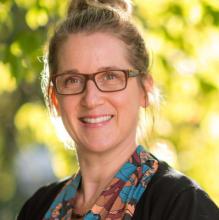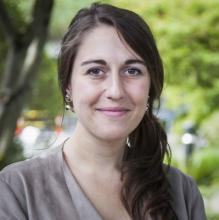To address the interpretability challenges introduced by big data in healthcare I am researching and developing data visualizations tools that are intended to be used by public health decision makers.
Research Description
Advances in technology have changed decision making by increasing the amount and diversity of data that can be routinely collected and stored. Public health agencies are using, or will eventually use, these new technologies to routinely collect complex patient genomic, spatial, and social network data to monitor and understand the spread of disease and to devise new interventions to avert deadly outbreaks. Despite the unprecedented availability of such “big data”, it is increasingly difficult to interpret. To address the interpretability challenges introduced by big data in healthcare I am researching and developing data visualizations tools that are intended to be used by public health decision makers. Humans have remarkable visual pattern recognition capabilities. Prior research shows that visualizing basic numerical information is a powerful way to equalize comprehension between individuals with different technical and non-technical backgrounds, but more work is required to handle the larger and more heterogenous datasets now available. My research is building upon and extending prior work by bringing together techniques from data visualization, epidemiology, and machine learning. You can learn more about my research on my website: https://cs.ubc.ca/~acrisan
What does being a Public Scholar mean to you?
The Public Scholar Initiative provides a platform and the necessary tools to engage with the wider community and see how my work impacts others. It will provide a way to reach the public that is hard to do without the right network of support. I am grateful for the opportunity to be part of this network and to have it shape my present and future research directions.
In what ways do you think the PhD experience can be re-imagined with the Public Scholars Initiative?
Open source tools are integral part of computer science research but are not necessarily well funded. I think the Public Scholars Initiative can create incentives for more PhD students to create and distribute open source tools, which will increase the practical applicability of a student’s doctoral work and ultimately advance both research and industrial development efforts.
How do you envision connecting your PhD work with broader career possibilities?
There is a broad interest in “big data” in many different disciplines beyond healthcare and a common challenge of grappling with data interpretability. Although my PhD work is most applicable to healthcare, many of the methods that I have developed can be used elsewhere, which will open up doors for interesting work in data science.
How does your research engage with the larger community and social partners?
My research engages with the larger community in two ways. First, I am connecting technical threads from several different research disciplines and am actively engaging with these different communities of researchers in order to translate knowledge between these disciplines. The second way that I am engaging with the wider community is by building open source resources and tools, supported in part with the funding from the Public Scholars Initiative, that others can use.
Why did you decide to pursue a graduate degree?
I was working in a data science research role at a Vancouver based start-up when I came upon a research problem that I was deeply interested in resolving. The problem was how I could help people understand so-called “big data” and the black box of algorithms and mathematics that accompanied big data analysis. I could only answer this question narrowly in that previous work environment and pursued graduate school to have the freedom to explore and probe this problem to the contentment of my curiosity.
Why did you choose to come to British Columbia and study at UBC?
UBC offered a lot of opportunities to do interesting interdisciplinary research and I had connected with two great people (Dr. Tamara Munzner and Dr. Jennifer Gardy) that would advise me in my doctoral research.
The Public Scholar Initiative provides a platform and the necessary tools to engage with the wider community and see how my work impacts others.




